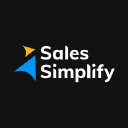Maximizing Efficiency and Profits with the Best Inside Sales Tools for Real Estate Industry
They trust us:





Best Inside Sales Tools For the Real Estate Industry

(source: https://images.app.goo.gl/xT5xU99JtE7tqsaW6)
In the real estate industry, inside sales teams are essential for generating leads, nurturing prospects, and closing deals. One of the best inside sales tools for the industry is HubSpot Sales. This software offers a range of solutions, including lead tracking, email templates, and deal management.
With its powerful tools and user-friendly interface, HubSpot Sales is an excellent choice for businesses looking to streamline their inside sales processes. Another popular inside sales tool is SalesLoft, which offers a range of features, including sales cadences, email tracking, and team analytics.
With its comprehensive tools and robust reporting, SalesLoft is a great choice for businesses of all sizes. Finally, Outreach is a comprehensive inside sales tool that offers a range of solutions, including sales cadences, email tracking, and deal management. Its powerful tools make it an ideal choice for larger businesses with complex inside sales needs.
Overall, these inside sales tools are essential for generating leads, nurturing prospects, and closing deals, making them a must-have for real estate professionals looking to improve their sales and business performance.
What is Sales Layer?
Sales Layer is a cloud-based product information management (PIM) software designed for businesses of all sizes to manage their product information and streamline their workflows. The software offers a range of features, including centralized product data management, multichannel publishing, and automated data synchronization.
One of the key benefits of Sales Layer is its centralized product data management capabilities. The software enables businesses to manage all their product information in one centralized location, making it easier to maintain consistency and accuracy across different channels and platforms.
Sales Layer also offers multichannel publishing capabilities, enabling businesses to publish their product information to multiple channels, such as e-commerce platforms, social media, and print catalogs. This can help businesses reach a wider audience and improve their overall marketing and sales efforts.
Another unique feature of Sales Layer is its automated data synchronization capabilities. The software enables businesses to automatically synchronize their product data across different systems and channels, reducing the risk of data errors and ensuring that the most up-to-date information is always available.
In addition, Sales Layer offers integration with popular third-party tools and services, such as Shopify and Magento, enabling businesses to seamlessly incorporate these tools into their PIM workflows.
Overall, Sales Layer is a powerful and flexible solution that can help businesses of all sizes streamline their product information management workflows and improve their overall marketing and sales efforts.
What are the features of Sales Layer?
Sales Layer is a Product Information Management (PIM) software that offers various features to help businesses manage their product information more efficiently. Some of the key features of Sales Layer are:
Centralized Product Data Management: Sales Layer offers a centralized platform to manage all product information, including descriptions, images, videos, and other product-related data, which can be accessed and updated in real-time.
Product Catalog Creation: Users can create catalogs for different channels, including eCommerce, social media, print, and more, with ease using Sales Layer. The platform allows users to customize catalogs with their own branding, images, and product information.
Data Enrichment: Sales Layer enables users to enrich product data with additional information such as product features, specifications, pricing, and other relevant details to enhance product descriptions and optimize customer experience.
Integration with Third-Party Systems: Sales Layer seamlessly integrates with various third-party systems, such as eCommerce platforms, CMS, and ERP, to ensure smooth data flow and eliminate data inconsistencies.
Data Quality Control: Sales Layer helps users maintain the quality of product data by performing automatic checks on data consistency, accuracy, and completeness, ensuring that the data is clean and error-free.
Multi-language Support: Sales Layer supports multiple languages, allowing users to manage product data in different languages for different markets.
Workflow Management: Sales Layer offers a collaborative environment for teams to manage workflows, track changes, and streamline product information management tasks.
Analytics and Reporting: Sales Layer provides detailed analytics and reporting tools to help users understand product performance, analyze customer behavior, and make data-driven decisions to optimize business strategies.
What is the pricing of Sales Layer?
Sales Layer offers two pricing plans, the Enterprise plan and the Pro plan. The Enterprise plan is tailored to the specific needs of the business and offers customized pricing. The Pro plan is designed for small to medium-sized businesses and offers pricing based on the number of SKUs.
The pricing for the Pro plan starts at $200 per month for up to 50,000 SKUs and goes up to $1,000 per month for up to 500,000 SKUs. There is also a custom pricing option available for businesses with more than 500,000 SKUs.
What is sales-i?
sales-i is a cloud-based sales enablement software designed to help businesses of all sizes drive more sales and improve their overall revenue growth. The software offers a range of features, including sales analytics and reporting, customer segmentation, and real-time alerts.
One of the key benefits of sales-i is its sales analytics and reporting capabilities. The software enables businesses to gain insight into their sales performance, including trends and patterns, enabling them to identify areas for improvement and make data-driven decisions.
sales-i also offers customer segmentation capabilities, enabling businesses to segment their customer base based on a range of criteria, such as buying behavior and purchase history. This can help businesses to tailor their sales and marketing efforts to specific customer segments, improving their overall effectiveness.
Another unique feature of sales-i is its real-time alerts. The software enables businesses to set up alerts based on specific criteria, such as changes in customer behavior or sales performance, enabling them to take proactive action and stay ahead of potential issues.
In addition, sales-i offers integration with popular third-party tools and services, such as Salesforce and HubSpot, enabling businesses to seamlessly incorporate these tools into their sales enablement workflows.
Overall, sales-i is a powerful and flexible solution that can help businesses of all sizes improve their sales performance, increase revenue growth, and achieve greater efficiency in their sales enablement workflows.
What are the features of sales-i?
sales-i is a sales analytics software that offers a range of features to help businesses understand and analyze their sales data. Some of its key features include:
Automated reporting: sales-i can automatically generate and send reports to help sales teams track their performance and identify areas for improvement.
CRM integration: sales-i can integrate with a variety of CRM systems, allowing sales teams to access and analyze data from multiple sources in one place.
Visual dashboards: sales-i provides customizable visual dashboards that allow users to easily track and analyze their sales data in real time.
Sales forecasting: sales-i offers sales forecasting capabilities to help businesses make informed decisions and plan for the future.
Mobile app: sales-i’s mobile app allows sales teams to access their data and reports on the go, from any device.
Product catalog management: sales-i includes a product catalog management feature that enables businesses to manage and update their product data in real time.
Automated alerts: sales-i can send automated alerts to sales teams when certain criteria are met, such as when a customer’s purchasing behavior changes.
Advanced analytics: sales-i offers advanced analytics features, such as predictive analytics and machine learning, to help businesses gain insights into their sales data and improve their performance.
What is the pricing of sales-i?
Sales-i offers different pricing plans based on the number of users and features required by the customer. The company does not publicly disclose its pricing information on its website, but interested customers can contact the sales team to request a quote.
What is Sales Simplify?
Sales Simplify is a cloud-based sales management software designed for small to medium-sized businesses. The software offers a range of features, including lead and opportunity management, contact management, and sales forecasting.
One of the key benefits of Sales Simplify is its lead and opportunity management capabilities. The software enables businesses to track their leads and opportunities from the initial contact through to the close of the sale, enabling them to identify potential bottlenecks and optimize their sales processes.
Sales Simplify also offers contact management capabilities, enabling businesses to store and manage their contact data in one centralized location. This can help businesses to maintain accuracy and consistency in their customer data, and improve their overall customer relationship management efforts.
Another unique feature of Sales Simplify is its sales forecasting capabilities. The software enables businesses to predict their sales revenue and pipeline based on historical data and other factors, helping them to make more informed decisions and plan for future growth.
In addition, Sales Simplify offers integration with popular third-party tools and services, such as Salesforce and QuickBooks, enabling businesses to seamlessly incorporate these tools into their sales management workflows.
Overall, Sales Simplify is a powerful and flexible solution that can help small to medium-sized businesses improve their sales management processes, increase their sales revenue, and achieve greater efficiency in their sales operations.
What are the features of Sales Simplify?
Sales Simplify is a sales automation tool designed to simplify and streamline the sales process. Some of its key features include:
Lead Management: Sales Simplify allows users to manage and track leads from multiple sources and assign them to sales reps. It also provides lead scoring to help prioritize follow-up.
Sales Pipeline Management: Users can track deals and opportunities through the sales pipeline, from initial contact to close. The software offers a visual sales pipeline to help sales reps and managers stay on top of deals.
Sales Forecasting: Sales Simplify provides forecasting tools to help sales teams estimate future revenue based on historical data and current trends.
Sales Analytics: The software provides detailed sales analytics, allowing users to track key metrics such as conversion rates, sales velocity, and sales performance.
Automated Sales Processes: Sales Simplify automates repetitive sales tasks, such as sending follow-up emails, scheduling appointments, and creating proposals, freeing up sales reps to focus on selling.
Mobile App: The software comes with a mobile app that allows users to access key features on the go.
Integrations: Sales Simplify integrates with a range of popular CRMs, including Salesforce, HubSpot, and Zoho, as well as with marketing automation tools and other sales and marketing software.
Customization: The software allows users to customize their sales processes and workflows to meet their specific needs, and also offers customizable reporting and dashboards.
What is the pricing of Sales Simplify?
Sales Simplify is an innovative software platform that helps real estate agents and brokers streamline their sales processes. It offers a range of pricing plans to suit different business needs, from basic to more advanced options. The basic plan starts at $99 per month, while the more advanced plans range from $199 to $499 per month.
All plans include features such as lead capture, automated follow-ups, client management, and reporting. There are also additional features available for an additional fee. Sales Simplify has been designed to help real estate agents and brokers save time, increase productivity, and generate more leads.
It automates many of the tedious tasks associated with sales, such as follow-ups and client management, so agents can focus on what matters most – closing deals. The software also provides detailed analytics and reporting, allowing agents to track their progress and identify areas for improvement.
Sales Simplify is a great choice for real estate agents and brokers who are looking to streamline their sales processes. It’s easy to use and offers a range of pricing plans to suit different business needs. With its advanced features and detailed analytics, Sales Simplify is the perfect solution for agents looking to increase their efficiency and close more deals.
What is Allego Sales Enablement?
Allego Sales Enablement is a cloud-based sales enablement software designed to help businesses of all sizes improve their sales performance and productivity. The software offers a range of features, including video-based learning, content management, and analytics and reporting.
One of the key benefits of Allego Sales Enablement is its video-based learning capabilities. The software enables businesses to create and deliver video-based training and coaching content to their sales teams, enabling them to improve their skills and knowledge in a more engaging and interactive way.
Allego Sales Enablement also offers content management capabilities, enabling businesses to store and manage their sales content in one centralized location. This can help businesses to maintain consistency and accuracy in their messaging across different channels and platforms.
Another unique feature of Allego Sales Enablement is its analytics and reporting capabilities. The software enables businesses to gain insight into their sales performance and effectiveness, enabling them to identify areas for improvement and make data-driven decisions.
In addition, Allego Sales Enablement offers integration with popular third-party tools and services, such as Salesforce and HubSpot, enabling businesses to seamlessly incorporate these tools into their sales enablement workflows.
Overall, Allego Sales Enablement is a powerful and flexible solution that can help businesses of all sizes improve their sales performance, increase productivity, and achieve greater efficiency in their sales enablement workflows.
What are the features of Allego Sales Enablement?
Allego Sales Enablement is a platform that helps organizations accelerate sales performance by providing sales teams with the content, coaching, and collaboration tools they need to drive revenue growth. Some of the features of Allego Sales Enablement are:
Content management: Allows sales teams to easily access and share the latest sales content, including product information, customer stories, and competitive analysis.
Learning and coaching: Provides on-demand training and coaching to help sales reps improve their skills and stay up-to-date with the latest trends and best practices.
Video coaching and feedback: Enables managers and peers to provide feedback on sales reps’ performance through video recordings, allowing for more personalized coaching.
Analytics and reporting: Provides insights into sales performance, content usage, and training effectiveness to help teams identify areas for improvement and optimize their sales strategy.
Mobile app: Allows sales reps to access content and training on-the-go, even without an internet connection, and provides notifications to keep them informed of new content and training opportunities.
Integration: Integrates with other sales tools, such as Salesforce, to streamline workflows and ensure data consistency across systems.
What is the pricing of Allego Sales Enablement?
Allego Sales Enablement offers several pricing plans based on the needs of the organization. For detailed pricing information, interested users can contact Allego’s sales team directly through their website.
What are Inside Sales tools?
Inside sales tools are software applications used to manage and automate the sales process for inside sales teams. These tools are designed to help sales representatives and managers streamline their sales workflows, increase efficiency and productivity, and close deals more effectively.
Inside sales tools typically include features such as lead management, contact tracking, email and call automation, and analytics and reporting. They can be used to manage a wide range of sales activities, such as prospecting, lead nurturing, and deal closing.
By using inside sales tools, sales teams can streamline their sales workflows, reduce manual data entry and errors, and improve communication and collaboration among team members. They can also gain insights into their sales performance and behavior, and make data-driven decisions to optimize their sales strategies.
Some popular inside sales tools include Salesforce, HubSpot, and Zoho CRM. These tools can be used by sales teams of all sizes and industries to manage and automate their sales processes, and optimize their sales strategies. Overall, inside sales tools are an important investment for any organization looking to improve their sales performance, increase efficiency and productivity, and close more deals effectively.
Why should Real Estate companies use Inside Sales tools?
(source: https://images.app.goo.gl/g1PujAfeAFGYdS5J8)
Real estate companies can benefit from using inside sales tools to streamline and optimize their sales processes, and to improve their lead generation and conversion rates. Inside sales tools allow real estate companies to automate a variety of tasks, such as lead tracking, prospecting, and follow-up, reducing administrative burdens and increasing efficiency.
These tools can also help real estate companies to improve their sales productivity and effectiveness, by providing real-time data and analytics on lead behavior and engagement. Additionally, inside sales tools can help real estate companies to personalize and optimize their sales messaging, by providing insights into buyer personas and preferences.
By using inside sales tools, real estate companies can improve their sales efficiency and effectiveness, generate more qualified leads, and ultimately, increase their revenue and market share.
What features should Inside Sales tools include for Real Estate agents?
Inside sales tools are essential for real estate agents who want to streamline their sales process and improve their conversion rates. When it comes to choosing the right inside sales tools, there are several key features that should be considered.
Firstly, the software should have an easy-to-use interface that allows real estate agents to manage their leads and contacts efficiently and effectively, including the ability to track lead sources and manage follow-up activities.
Secondly, the software should have the ability to automate routine sales tasks, including the ability to send automated emails and follow-up messages, and schedule appointments.
Thirdly, inside sales tools for real estate agents should include features that allow for personalized outreach, including the ability to segment leads and deliver customized messages based on their interests and behavior.
Fourthly, the software should have the ability to provide real-time analytics and reporting on sales performance, including the ability to track lead and conversion rates, and identify areas for improvement.
Fifthly, the software should have the ability to integrate with other tools and platforms used by real estate agents, such as CRM systems and marketing automation tools.
Lastly, the software should have the ability to provide training and support for real estate agents, including the ability to access online resources and receive personalized coaching and feedback.
With these key features, real estate agents can streamline their sales process, improve their conversion rates, and build strong relationships with potential clients. This allows them to maintain a competitive edge in the industry and grow their business.
What types of integrations are important with Inside Sales tools for Real Estate agents?
(source: https://images.app.goo.gl/T7rkeWz3vayhy4XR6)
Integrations are an important aspect of inside sales tools for real estate agents, as they can help to improve sales performance, streamline workflows, and enhance customer experience. Some of the key integrations to look for when selecting an inside sales tool include:
CRM software: Integrating inside sales tools with CRM software can allow real estate agents to manage their customer data more effectively. This integration can help agents to track customer interactions, manage leads and deals, and personalize the customer experience.
Email marketing software: Integrating inside sales tools with email marketing software can allow real estate agents to manage their email marketing campaigns more effectively. This integration can help agents to create and send personalized email campaigns, track engagement, and improve their overall email marketing strategy.
Lead generation software: Integrating inside sales tools with lead generation software can allow real estate agents to generate leads more effectively. This integration can help agents to identify new prospects, track lead activity, and manage their lead pipeline more effectively.
Web conferencing software: Integrating inside sales tools with web conferencing software can allow real estate agents to hold virtual meetings with their clients more effectively. This integration can help agents to schedule and host virtual meetings, share screens and documents, and collaborate with clients more effectively.
By selecting an inside sales tool with these integrations, real estate agents can improve sales performance, streamline their workflows, and enhance customer experience, ultimately improving their business operations and growth.
What are the benefits of using Inside Sales tools for Real Estate companies?
Inside sales tools offer numerous benefits to real estate companies. Firstly, they provide a way to streamline sales processes and workflows, improving sales efficiency and productivity. This can help to increase the number of sales made and ultimately lead to increased revenue.
Secondly, inside sales tools can help real estate companies to improve lead generation and management, by providing a way to track and prioritize leads, and follow up with them in a timely and personalized manner. This can help to improve the quality of leads and increase conversion rates.
Thirdly, inside sales tools can help real estate companies to improve sales team collaboration and communication, by providing a way to share information and insights, and collaborate on deals. This can help to improve teamwork and increase sales effectiveness.
Overall, the benefits of using inside sales tools in the real estate industry are clear. They provide improved sales efficiency and productivity, lead generation and management, and sales team collaboration and communication. These benefits can ultimately lead to increased business success and profitability for real estate companies.
How to choose the right Inside Sales tool for your Real Estate business?
(source: https://images.app.goo.gl/bYCppFiccXrQCENz9)
Choosing the right inside sales tool is essential for any real estate business looking to improve their sales process and drive revenue growth. Here are some factors to consider when selecting an inside sales tool:
Sales features: Look for a tool that provides comprehensive sales features, such as lead tracking, contact management, and sales forecasting.
User-friendliness: Choose a tool that provides a user-friendly interface and easy-to-follow sales steps, enabling you to easily manage and track sales.
Customization: Select a tool that allows you to customize your sales workflows and reports to fit your real estate business’s needs.
Integration: Look for a tool that integrates with your existing software and systems, such as your CRM or marketing automation software, to ensure a smooth workflow.
Communication channels: Choose a tool that supports multiple communication channels, such as email, phone, and social media, enabling you to connect with leads and customers through their preferred channel.
Reporting and analytics: Select a tool that provides reporting and analytics capabilities, allowing you to track sales performance and identify areas for improvement.
Support: Look for a tool that offers reliable customer support, including tutorials, forums, and live chat or phone support.
Security: Choose a tool that provides secure and encrypted data handling, protecting sensitive sales data and customer information from unauthorized access.
Cost: Compare the costs of different tools and choose one that fits your budget while still providing the functionality you need.
Ultimately, the right inside sales tool can help you improve your sales process, drive revenue growth, and increase customer satisfaction for your real estate business. By considering the above factors and choosing a tool that meets your specific needs, you can ensure that you have the right inside sales solution in place.
How much does the Inside Sales tools cost for the Real Estate industry?
Inside sales tools are an important component of the real estate industry, enabling businesses to manage their sales process more effectively, and increase conversions and revenue. The cost of inside sales tools can vary widely, depending on the specific software and the features and capabilities it offers.
Some basic inside sales tools can be obtained for free, while more advanced and sophisticated software can cost several hundred to several thousand dollars per year. For example, popular inside sales tools like HubSpot Sales and Salesforce Sales Cloud can cost between $25 to $150 per user per month, depending on the level of features and functionality required.
However, some providers offer custom pricing plans, which can help real estate businesses to manage their costs more effectively. Additionally, some inside sales tools are designed specifically for real estate businesses, which can provide tailored features and support.
Overall, the cost of inside sales tools will depend on the specific needs and budget of the real estate business, and it is important to carefully evaluate different options before making a decision.
Why are Inside Sales tools important for the success of your Real Estate business?
(source: https://images.app.goo.gl/A62tXLmaEYdqpWyj9)
Inside sales tools have become increasingly important in the real estate industry, particularly for businesses that want to improve their sales processes and increase their revenue. These tools offer a range of benefits that can help to improve the success of a real estate business.
One of the key benefits of inside sales tools is that they provide real estate professionals with the tools and resources they need to better understand and engage with their clients and customers. By providing features such as lead tracking, customer profiling, and contact management, inside sales tools can help real estate businesses to more effectively target their sales efforts, improving the chances of success.
Another important advantage of inside sales tools is that they can help to improve sales productivity and efficiency. By providing features such as automated lead nurturing, sales pipeline management, and sales forecasting, inside sales tools can help real estate businesses to more easily manage their sales processes, reducing the time and effort required to close deals.
In addition, inside sales tools can help to improve collaboration and communication between sales teams and other departments, such as marketing and customer service. By providing features such as shared calendars, task management, and reporting and analytics, inside sales tools can help real estate businesses to better coordinate their efforts, improving overall efficiency and performance.
Overall, inside sales tools are an essential component of any successful real estate business that wants to improve their sales processes and increase revenue, providing a range of benefits such as improved understanding and engagement with clients and customers, improved sales productivity and efficiency, and improved collaboration and communication between sales teams and other departments.
How to implement Inside Sales tools as a realtor?
Implementing inside sales tools as a realtor can help you streamline your sales process, increase efficiency, and improve your conversion rates. Here are some steps to help you get started:
Identify your inside sales needs: Before implementing inside sales tools, it’s important to identify your needs. What types of leads do you want to target, and what types of sales processes do you need to automate?
Choose an inside sales tool: There are many inside sales tools available, each with its own set of features and capabilities. Some popular options for realtors include HubSpot Sales, Salesforce, and Zoho CRM.
Set up your inside sales tool: Once you’ve chosen an inside sales tool, you can start setting it up. This may involve configuring your lead sources, defining your sales processes, and integrating your tool with your website or other digital properties.
Manage your leads: With your inside sales tool in place, it’s time to start managing your leads. This may involve tracking lead activity, assigning leads to sales reps, and setting up lead scoring rules.
Automate your sales processes: With leads managed, it’s important to automate your sales processes to increase efficiency and improve conversion rates. This may involve setting up automated email sequences, creating custom sales pipelines, and using AI-powered lead scoring and prioritization tools.
Analyze sales performance: With sales processes automated, it’s important to analyze performance to identify areas where you can optimize your sales funnel. This may involve tracking key performance indicators (KPIs) such as conversion rates, lead response times, and sales cycle length.
By implementing inside sales tools as a realtor, you can streamline your sales process, increase efficiency, and improve your conversion rates, ultimately helping you to drive better business outcomes and improve your bottom line.
Which type of real estate companies should buy Inside Sales software?
(source: https://images.app.goo.gl/5eczrm7jF2TrgXcr7)
Real estate companies that rely on inside sales reps to generate leads, qualify prospects, and close deals should consider purchasing inside sales software. This type of software can help real estate professionals streamline their sales processes, such as lead management, pipeline tracking, and performance reporting.
Inside sales software can help real estate companies improve their sales productivity, efficiency, and effectiveness by providing real-time analytics and insights into sales metrics and trends. Additionally, inside sales software can help real estate companies save time and resources by automating tasks such as call recording, email tracking, and lead scoring.
For example, inside sales software can help real estate companies prioritize leads based on their level of engagement, interest, or readiness to buy. Finally, inside sales software can help real estate companies enhance their sales performance and customer satisfaction by providing tools for sales coaching, training, and feedback.
Overall, inside sales software can help real estate companies improve their sales performance, increase revenue, and achieve their business goals.
Final thoughts on using Inside Sales tools for real estate agents
In conclusion, using Inside Sales tools can be a valuable asset for real estate agents who want to optimize their sales processes and improve their lead conversion rates.
These tools allow agents to manage their sales activities, such as prospecting, qualifying, and nurturing leads, through an online platform, which can automate tasks, such as lead scoring, email campaigns, and follow-up reminders. By using Inside Sales tools, agents can save time and resources, while also improving the efficiency and effectiveness of their sales efforts.
According to industry experts, companies that use Inside Sales tools have seen a 20% increase in sales productivity and a 30% increase in lead conversion rates. Overall, Inside Sales tools can help real estate agents engage with their leads more effectively, build stronger relationships with their clients and partners, and ultimately, drive more business.
Top 4 Inside Sales tools for real estate agents
| Sales Layer | |||
| sales-i | |||
| Sales Simplify | |||
| Allego Sales Enablement |









